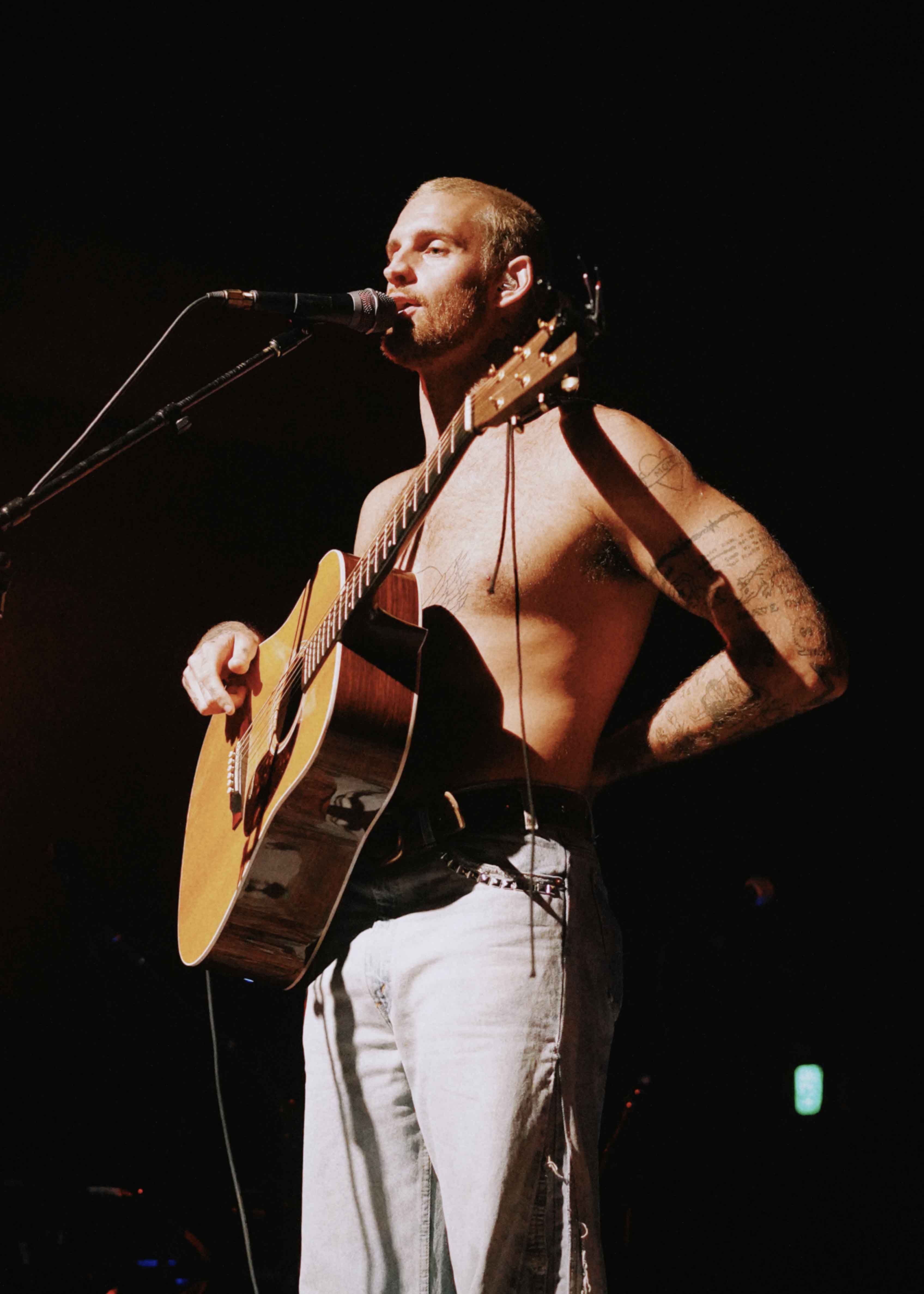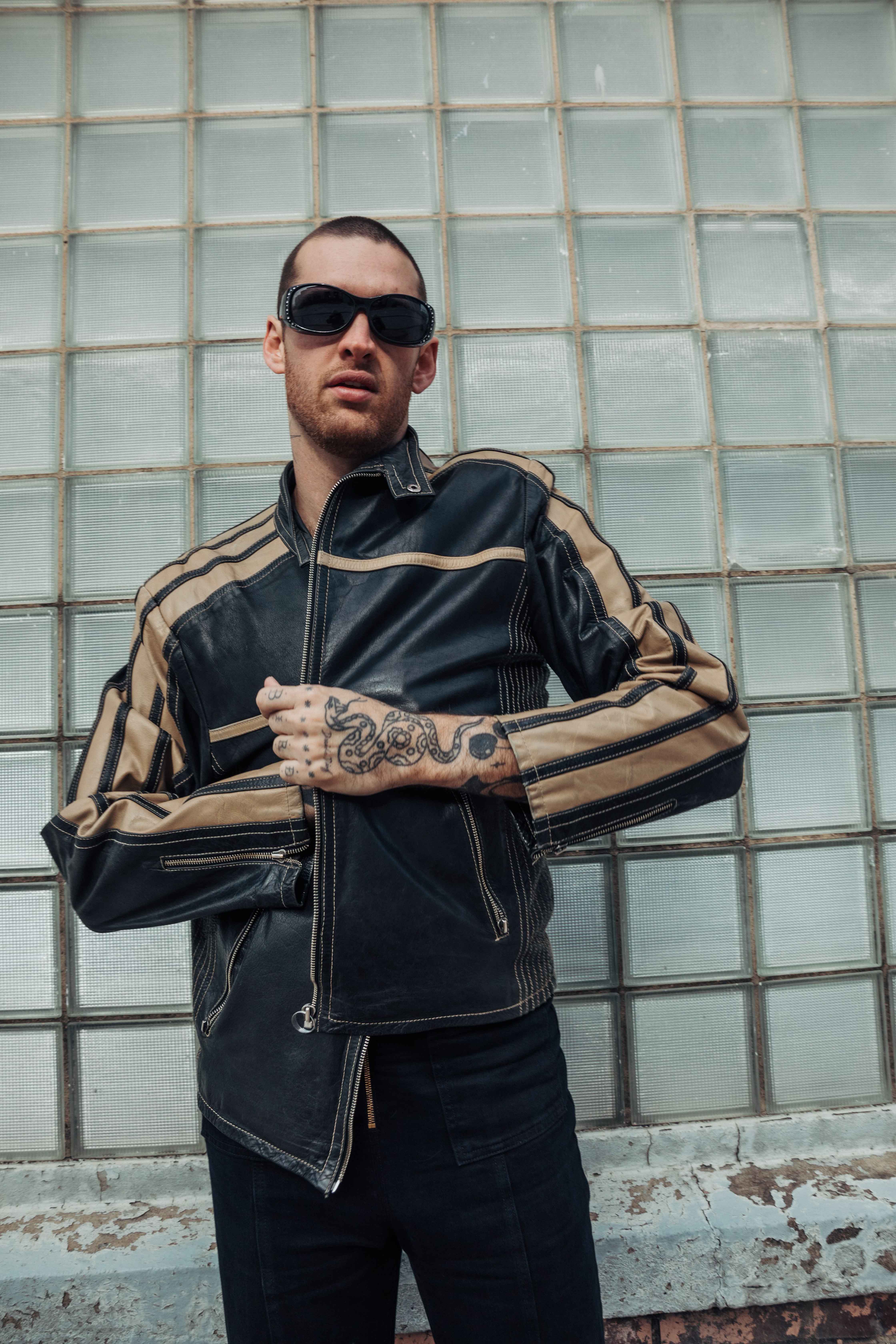Q&A: BabyJake discusses influences behind album ‘Beautiful Blue Collar Boy’
Singer-songwriter BabyJake glances at the camera while wearing a black and beige leather jacket and leopard print sunglasses. The Nashville-based artist will release his new album “Beautiful Blue Collar Boy” on Friday. (Courtesy of Anne Tenkhoff)
“Beautiful Blue Collar Boy”
BabyJake
BabyJake Music / ALTER Music
Sept. 13
By Reid Sperisen
Sept. 10, 2024 12:00 p.m.
BabyJake is reconnecting with his roots to push his music forward.
Perhaps best known for his viral 2019 single “Cigarettes On Patios,” the 27-year-old singer-songwriter spent this summer on tour with Hobo Johnson and will embark on his own tour beginning Oct. 14. He has also released three singles since May – “Bottom of a Dirty Shoe,” “Arian(e)” and “Momma 212” – that incorporate influences stretching from Bob Dylan to Tom Petty and are set to be featured on his upcoming album, “Beautiful Blue Collar Boy.”
Ahead of his album release Friday, BabyJake spoke with the Daily Bruin’s Reid Sperisen about his sound and artistic direction.
This interview has been edited for length and clarity.
[Related: Q&A: Mitch Rowland talks origins and creative process of debut album ‘Come June’]
Daily Bruin: You grew up in Florida and spent some time living in Los Angeles but have been in Nashville for the past couple of years. How would you say that the Nashville experience and environment have influenced the development of “Beautiful Blue Collar Boy,” both sonically and lyrically?
BabyJake: I couldn’t have done this album without the players that are in Nashville. What people don’t understand about Nashville is how many ridiculously talented players live here. You can find five different guitar players for five different styles, five different types of playing. I would say that it greatly impacted the album. I probably have 15 different players that are playing on this record. I’ve got bass players, I’ve got horns players, and every one of them is very talented and is based in Nashville, and I think that’s something that gets slept on a lot here. People think of this place as a country music place where, right now, in general, Nashville is turning into this hub of live music, where you have people that are great players for recording, people that are great players for playing out live with a band. It’s quite a magical place, honestly, especially in the creative aspect of recording.

DB: Your music seems to incorporate a wide range of subgenres, from funk to hip hop, rock, the country influence and pop. What is your approach to determining the genre or production for your songs, and how do you generally go about blending multiple sounds in the same track?
BabyJake: With “Beautiful Blue Collar Boy,” I was making music and not thinking about, “Oh, this one might be too punk, or this one might be too pop or whatever.” I just sat down and made the records. And I think that’s the best place to be for me. I’ve realized that an important thing that ensures that everything is cohesive is a lot of live drum. I just think live drums, for what I’m particularly trying to do, especially when it translates to a live show, is the one piece of cohesiveness that I need. However, you can hear me on songs like “We, You, and I,” and other records where I start to put synths in, where a year and a half ago, I was anti-synth. And now I’m in this mindset where, clearly, you can tell in my career, I’m very indecisive as far as genres go. So I think I finally found with “Beautiful Blue Collar Boy” my through line, which is, “How is it going to translate live?” I love performing live. I’ll be playing live shows for a long time. That’s one of my bread-and-butter things. Thinking about it in that aspect really helped me, in general, with this album. I’m not really thinking about what would be the right genre or choice, or song or instrument, just doing whatever my brain says is right.

DB: What does your approach to songwriting usually look like? Would you say that you start with the melody first or the lyrics?
BabyJake: Half of the time I’m sitting down, I’ve come up with some chords, and I’m writing the lyrics the same time as I’m writing the progression out for the song. I’m just structuring it and building it in my head with my Notes app in front of me, writing lyrics. Two years ago, a year and a year and a half ago, I got this freedom in writing, where nothing mattered anymore, and I thought I was going to shake it eventually, but it’s just stayed with me where it’s just like, “Don’t think about it too much, just write the song.” Other times, I’m writing something that’s very personal to me or something that’s bothering me in the moment – that’s very elaborate and focused. But I think in general, I’m just in this spot where I’m so blessed and thankful to be in, where I just feel like I could go pick up an instrument any day, any hour, sit down, make some chords, write a song.
It wasn’t always like that for me. I grew up in an era of being in Florida where I think it was very cool to be drunk. Even when I got to LA, which, as we all know, LA is a crazy, large place with lots of ability to do those things. I think as I started to give up substances, as I started to get more into my health, into my athletic health, into my spiritual health, my mental health, I really opened up these pathways for songwriting in my brain that I never thought I even had. Now, I can sit down and just write something, and I don’t know where it comes from. I don’t know how it’s going to come to me. But it can change in every which direction. It’s a magical thing. I don’t really understand it at all.
[Related: Q&A: Alumnus India Carney talks passion for arts education, upcoming event at The Nimoy]
DB: How did you choose the title “Beautiful Blue Collar Boy” for this album, and what do these words mean to you? What do you hope that this title conveys to your listeners?
BabyJake: The reason I picked “Beautiful Blue Collar Boy” is essentially me saying, “Hey, I’m a normal guy. I just happen to write songs.” The way that I wanted to record the album and produce the album and make the album was very much, “I’m going to do it my way, and I’m going to go back to the roots, and I’m going to sit with this and decide: Who am I really?” What I had to bring it back to for this record and for this album was to see where I am and what I am. So I think the reason I named it “Beautiful Blue Collar Boy” is because, to me, that’s what I am. If I wasn’t working in music, I think I’d be doing something with my hands that’s physical and labor intensive. To me, music is almost like that. I look at it as a job, and I love it. I’m lucky to love it and really love the grind of it, but I look at it as this blue collar thing. When I sit down and make music, I’m putting a hard hat on, and I’m like, “Let’s get after it.” This album was the first time in a long time that I got to sit down, put the cap on, enter the construction site and get after it. I realized that discipline and persistence and falling in love with the grind of life is the true way to come to grips with reality and really get happiness. That’s how I relate it to the blue collar lifestyle.
